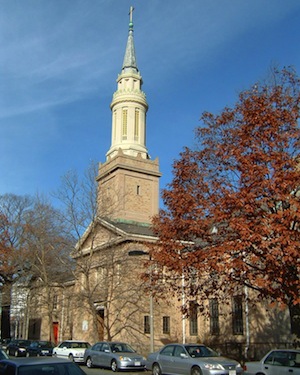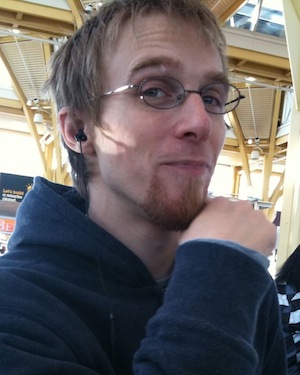
Playing Church
Sometimes it feels like we’re just playing church the same way you play house as a kid. You put on a costume, set things up just right, and then go through the motions of what all-too-often feels like nothing more than a religious country club with eternal benefits. Church then becomes a self-preserving entity that cares more about its own existence than those who outside its circle of membership. But church is more than an imaginary game you play; it is the presence of God, working in (and sometimes in spite of) the people it consists of.
In the spring of 2013 I was invited to join a group in Washington, D.C., as it explored a theology of social justice, seeking a robust and intentional expression of the church in the world. Rather than asking what it means to play church, we were asking what it means to be church. How are we called to live beyond the confines of four walls and a steeple? What does it mean to love mercy, do justice, and walk humbly? And what does it mean to express and experience a theology of social justice?
Hearing the Cry
Growing up I was taught to fold my hands and say, “This is the church, this is the steeple, open the doors and see all the people.” However, this cute (and trite) rhyme is misleading because the church is not the structure but the people that give it life. Buildings come and go, but the church remains and endures. The church is the community gathered and scattered, feet firmly planted on holy ground in the deserts and oases of life.
In the third chapter of Exodus, Moses is looking for a stray sheep when he encounters God in a bush that will not stop burning. God tells him that God hears the cry of the oppressed. And then God sends Moses to respond to it.
A theology of social justice is one that hears the cries around us. It confronts us and the systems we knowingly and naively support. It challenges us not only to love mercy and do justice, but to walk humbly with God along the way, knowing that each step we take is on ground that God has already made holy. Only sometimes we’re moving too fast to notice it.
From Idea to Action
I went to college in Grand Rapids, Michigan and eventually ended up attending the big church in town. I resisted going my first few years, convincing myself that a smaller community was more authentic. Eventually I gave in and decided to see what this mega-community was like. And I was blown away.
___________________________________________
God has hands, and they are attached to your wrists.
___________________________________________
Every week I would hear about ways I could get involved in serving others, both locally and globally. This community taught me about the difference between relief and development and how we must always work from one towards the other. This community reminded me that the church is a group that exists for the benefit of those who are not a part of it. God is up to something in the world and the church is invited to join in on this work of reconciliation and restoration. The people of God have always been blessed to be a blessing, joining God’s ongoing work of New Creation in the world around us. This large Grand Rapids congregation was a community that would not settle with playing church but was committed to being the church.
During our weekend in Washington, D.C. we spent a day at the Church of the Savior. Rather than a single church, the Church of the Savior is a network of nine independent faith communities and over forty ministries. If ever a community took seriously the task of being the church, it is the Church of the Savior. With a unique empowerment of laity and an emphasis on “mission groups,” these faith communities are radically committed to hearing the cries around them and joining God to restore all things.
A theology of social justice is not an idea but an action. It is praxis more than it is doxis. So often we focus on our credo (I believe) forgetting that our true credo is our ago (I do). At the Church of the Savior, I encountered groups of people radically committed to living out their faith, manifesting a theology of social justice on the ground rather than in their heads. It’s one thing to think about a theology of social justice, but it is an entirely other (and entirely necessary) thing to bring it to life.
God has Hands
God has hands, and I don’t mean that anthropomorphically. God has hands, and they are attached to your wrists. When the Bible talks about the Church as the Body of Christ, I think this is a metaphor we should take literally. The people of God are the hands and feet and face of God in a broken and fractured world. Our hands can hurt and our hands can help. The can kill or they can create. Only sometimes rather than using our hands, we end up sitting on them, waiting for someone else to fix all the problems around us.
Holding your hands open in front of you, you find yourself in a posture to both give and receive. The Church is blessed to be a blessing, to be empowered by the holy breath of God to hear our neighbors’ cries and open our hands to the world around us.
A theology of social justice reminds us that a just church is more than just church. When the church is committed to justice, it is committed to doing more than just getting by or maintaining the status quo. It is committed to taking off the dress-up clothes, and ending the imaginary games of playing church. A just church enters the world – living for and serving God, community, and the world in radically new and necessary ways.
This world does not need just another church. Instead it needs another just church.
Do justly. Love mercy. And walk humbly with God.
AUTHOR BIO: Jim Kast-Keat is the Associate Minister for Education at Middle Collegiate Church in New York City. Prior to working at Middle, he helped lead a radical theology collective called ikonNYC, wrote and designed church resources and curriculum with Sparkhouse in Minneapolis, MN, and served as a pastor at Mars Hill Bible Church in Grand Rapids, MI. To find out more about Jim head over to jimkastkeat.com.Read more articles in this series.







Unbound Social